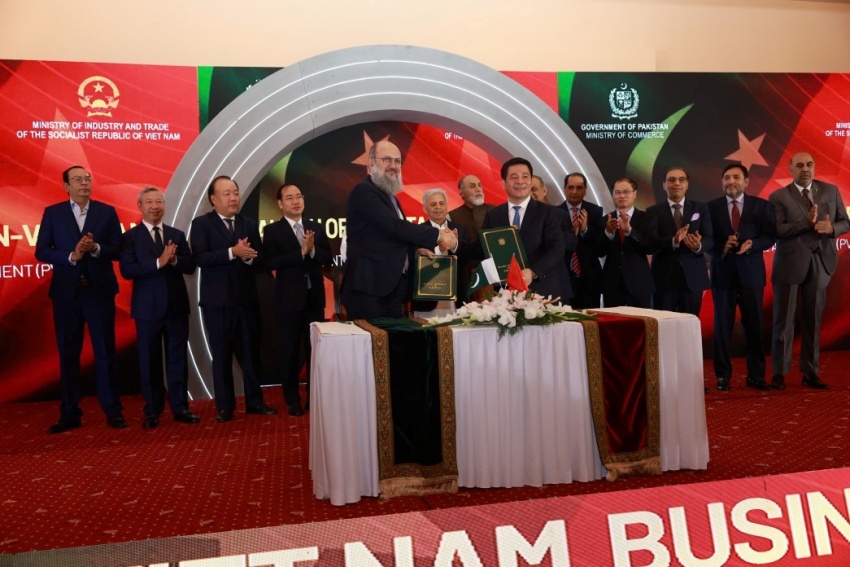 |
On October 14 in Islamabad, Minister of Industry and Trade Nguyen Hong Dien and Pakistan’s Minister of Commerce Jam Kamal Khan signed a joint declaration to begin PTA talks, marking both governments’ commitment to removing trade barriers and expanding market access. Negotiations are expected to start immediately, with the aim of concluding the agreement by year’s end.
Minister Dien pointed out that Pakistan’s strategic position linking Southeast Asia with South Asia and the Middle East makes it a natural partner, yet Vietnamese goods still face high tariffs, technical standards, and quarantine procedures. “Many products with strong export potential encounter tariff and technical barriers, limiting their competitiveness,” he said, urging faster removal of obstacles and stronger connectivity in transport and logistics.
Both sides stressed that cooperation should focus on sectors where the two economies complement rather than compete. Textiles and footwear stand out as a natural fit, with Pakistan being one of the world’s largest cotton and yarn producers, while Vietnam has established itself as a major centre for garment and footwear manufacturing.
“If we jointly build a supply chain from Pakistan’s cotton and yarn to Vietnam’s garment and footwear production, our products will be able to capture premium markets in Asia, the Middle East, Europe and the United States,” Minister Dien remarked.
Agriculture and Halal food are also expected to become major pillars of collaboration. Vietnam is a leading global exporter of tropical agricultural products, while Pakistan has a well-developed Halal certification industry and a sizeable domestic market. Both sides believe that aligning Halal standards could turn Vietnam into a gateway supplier of Halal-certified produce to ASEAN, while Pakistan could expand its Halal value chains across the Asia-Pacific.
Energy, materials, and pharmaceuticals were identified as long-term areas of strategic cooperation. Vietnam has expressed readiness to welcome Pakistani investment in industrial materials, chemicals, machinery, and clean energy, while Vietnamese enterprises are interested in exploring oil and gas, renewable energy, and mechanical engineering projects in Pakistan.
In pharmaceuticals, Pakistan’s strength in generic medicines and Vietnam’s expertise in herbal medicine and vaccines could support joint production to meet international standards, diversify exports to third markets, and reduce reliance on external suppliers.
Digital innovation is another promising field. Vietnam is emerging as a digital hub in Southeast Asia, while Pakistan’s startup ecosystem is rapidly expanding, particularly in fintech and e-commerce. Cooperation in smart agriculture, logistics technology, and cross-border e-commerce could accelerate digital transformation in both countries. “This would support economic modernisation while creating opportunities for young entrepreneurs in both nations,” he suggested.
For his part, Minister Jam Kamal Khan said Pakistan was eager to expand cooperation with Vietnam across key sectors, including trade in goods and services, investment, Halal industries, civil aviation, and healthcare. “Pakistan and Vietnam enjoy a friendship based on mutual respect and understanding. Now is the right time to raise our partnership to a new level,” he stressed.
Both sides agreed to intensify efforts to tackle long-standing impediments, particularly in transport connectivity and non-tariff barriers. Business-to-business links will be strengthened through enhanced trade promotion and greater support from chambers of commerce and relevant agencies. As one Vietnamese official noted, strong government facilitation is essential to turn political determination into practical outcomes.
The launch of negotiations on the Vietnam–Pakistan PTA marks more than a symbolic step. It represents a shared vision to integrate supply chains, create a stable framework for investment, and prepare the ground for a possible comprehensive Free Trade Agreement in the future. Analysts expect that bilateral trade, currently less than $1 billion annually, could increase five- to ten-fold in the coming years if the agreement is concluded and effectively implemented.
Bilateral trade has grown in recent years but remains far below potential. According to Vietnamese officials, two-way trade reached $705 million in 2023 and $850 million in 2024, while the figure in the first nine months of 2025 stood at just under $600 million.




